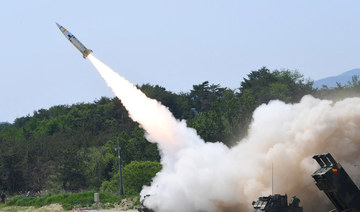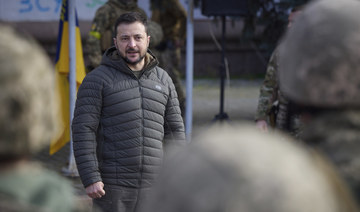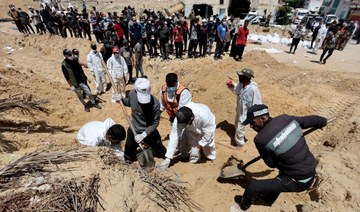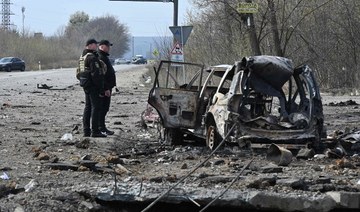WAKISO, Uganda: Some menstruating schoolgirls were locked in dormitories while their peers were in class. To avoid the humiliation, others stayed home.
As more girls skipped class because they could not afford sanitary pads, authorities at a government-backed school outside Uganda’s capital, Kampala, were forced to do what few have done: Provide free sanitary pads.
“We looked at the absenteeism rate and you would find that in a class if there are six people who are absent, at least four of them are girls. Some boldly came to us and said, ‘When we are on our period there is no care, so that’s why we prefer staying at home,’” said Vincent Odoi, a teacher at Wampewo Ntakke Secondary School.
Menstrual hygiene has emerged as a serious, and often emotional, subject in Africa, where some experts say governments must supply free sanitary pads to schoolgirls who often are at risk of dropping out because of embarrassment.
The issue recently became politically charged in Uganda when a prominent academic was jailed for calling President Yoweri Museveni “a pair of buttocks” after the government broke a promise to provide free sanitary pads to schoolgirls across the country.
One in 10 African schoolgirls misses school during menstruation, according to the UN, and many, after lagging behind, eventually drop out.
Last month, Kenya’s President Uhuru Kenyatta signed a law authorizing his government to supply sanitary pads to teenage girls at public schools nationwide. Zambia announced a similar plan in 2016 targeting schoolgirls in rural and semi-rural areas.
But elsewhere in Africa, appeals for free sanitary pads have not been so successful.
Stella Nyanzi, a research fellow at Uganda’s Makerere University, faces criminal charges after she accused the country’s first family of being out of touch with ordinary people when the government said it couldn’t afford to donate sanitary pads.
“Girls and young women are not going to stop menstruating in the near or far-off future,” Nyanzi’s campaign, dubbed #Pads4GirlsUg, told reporters after she was released from jail in May. The campaign has raised nearly $10,000, and Nyanzi visits schools where she distributes the pads amid boisterous song and dance.
About 34 percent of Uganda’s population lives below the poverty line on less than $2 per day, according to World Bank figures. Much of sub-Saharan Africa faces similar levels of poverty, or worse.
At Wampewo Ntakke Secondary School outside Kampala, authorities once confined menstruating girls to dormitories because there was no running water and some girls, lacking sanitary pads, stank in class. But there was another problem: Imported sanitary pads were rapidly filling up the latrines, imposing new costs for frequently emptying them.
In the end, the school’s board decided in 2013 that it would be wiser to provide locally made, biodegradable sanitary pads to all schoolgirls. The move has all but ended absenteeism tied to sanitary hygiene, said Odoi, who oversees the program.
“It’s something we put in our budget, just like any other expenses like electricity, water and others,” he said. “We said, ‘Let’s provide for a certain amount of money to cater for this,’ and it has worked. We have not seen that expenditure entering so deep in our pockets. It can be done.”
The school spends about $1,000 on sanitary pads for each three-month academic term.
Student Patricia Mukashema said the school’s generosity helped families who could not afford the pads. “Now we don’t put that pressure on our parents,” she said.
Another student, Patience Atim, said she was touched by news reports of schoolgirls in rural Uganda who cite “too much suffering” when they use crude substitutes for pads.
“They will use bedsheets, fibers,” she said.
The pad given out at the school is known as Makapad, the product of a Ugandan academic who created it with the backing of the Rockefeller Foundation. The pads — made from waste paper and with papyrus as the absorbent — sell for half the price of imported pads, yet there is not widespread demand for them, said inventor Moses Musaazi.
Sixty-three cents — or 2,300 Uganda shillings — for a pack of 10 Makapads is still a lot of money for some Ugandans, Musaazi said.
“It’s a mindset of poverty. When somebody is poor, you wouldn’t want to spend a shilling, even if it is on a vital component of their life. What they think is essential is not a sanitary pad.”
Since 2005, when Makapads were unveiled, most have been bought by the UN refugee agency in Uganda, said Juliet Nakibuule, who runs Technology for Tomorrow, a local company that distributes them.
Odoi, the school official, said he has come to think of sanitary pads as essential for schoolgirls’ well being, as important as food and drink.
“If other head teachers can follow the same example and give out free pads, I think it will be very good for this country,” he said.
For many African girls, menstruation means humiliation
For many African girls, menstruation means humiliation
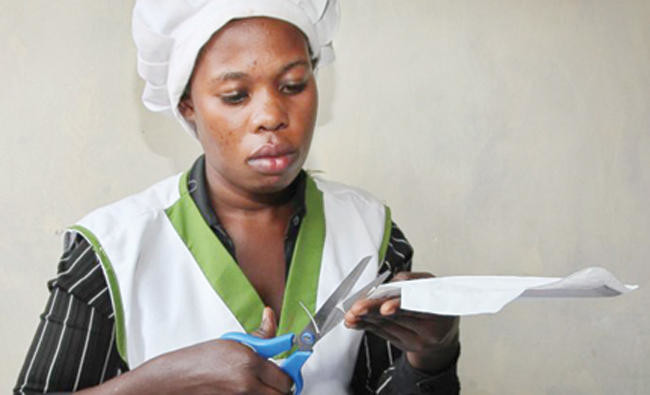
‘Uncommitted’ organizers will join campus protesters in Michigan over Gaza
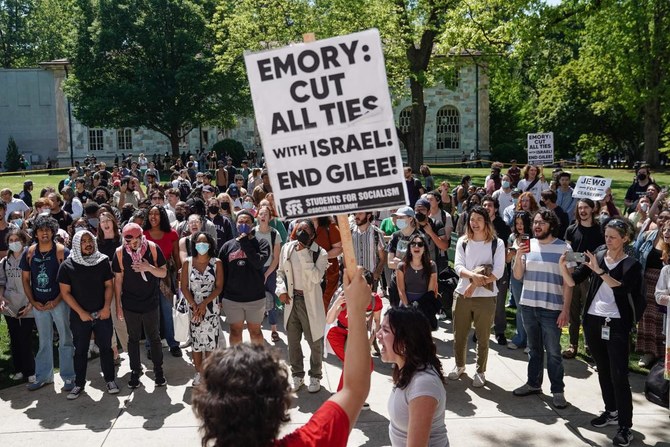
- Student protests in the US over the war in Gaza have intensified and expanded over the past week
- Democrats have become increasingly uneasy over the US support for Israel as the death toll and destruction climb in Gaza
WASHINGTON: Organizers behind the “uncommitted” political movement against President Joe Biden’s staunch support for Israel’s war against Hamas will travel to the University of Michigan’s campus on Thursday to join students protesting the war.
Student protests in the US over the war in Gaza have intensified and expanded over the past week after police first arrested students at Columbia, with so-called Gaza solidarity encampments established at colleges, including Yale, and New York University. Police have been called in to several campuses to arrest hundreds of student demonstrators.
Uncommitted organizers will travel to the University of Michigan’s Ann Arbor campus, they told Reuters, bringing together a political movement that’s disrupted Biden events and amassed hundreds of thousands of votes in Democratic primaries and a student movement that’s drawn students and faculty of various backgrounds.
Biden won Michigan by less than a 3 percent margin in 2020.
Democrats have become increasingly uneasy over the US support for Israel as the death toll and destruction climb in Gaza. A growing revolt inside the Democratic base signifies the challenge Biden faces in bringing together the coalition he needs to defeat Republican frontrunner and former President Donald Trump.
“President Biden is choosing to put his hands over his ears and ignore the hundreds of thousands of people who have already come out against the war at the ballot box,” said Abbas Alawieh, a prominent “Uncommitted” organizer, who is going to Ann Arbor with Layla Elabed, another Michigan organizer.
“Signing into law more money for Israel is sending a clear message to uncommitted voters, young voters that he doesn’t care to engage seriously with our demands to end this war,” he said, referring to the $26 billion in new aid Biden recently approved.
Alawieh said the uncommitted movement has not been coordinating with student groups so far. “We have an electoral focus, but we certainly see the demands of student protesters, who are calling for peace,” he said.
On campuses where protests have broken out, students have issued calls for a permanent ceasefire in Gaza, an end to US military assistance for Israel, university divestment from arms suppliers and other companies profiting from the war, and amnesty for students and faculty members who have been disciplined or fired for protesting.
Biden told reporters on Monday that he condemned both “antisemitic protests” and “those who don’t understand what’s going on with the Palestinians.” Biden campaign spokeswoman Lauren Hitt has said the president “shares the goal for an end to the violence and a just, lasting peace in the Middle East. He’s working tirelessly to that end.”
Trump called the campus protest situation “a mess” as he walked into his criminal trial in New York.
The uncommitted movement amassed sizable vote totals in Michigan, Minnesota and Hawaii primaries and had won 25 delegates as of the beginning of April. They are preparing to target the Democratic National Convention in Chicago in August, where Biden is expected to be nominated.
Polls show Biden and Trump running neck-and-neck ahead of their Nov. 5 election rematch nationally. Biden’s 2020 victory was due to narrow wins in key swing states like Michigan.
US nudges Germany on long-range missiles for Ukraine
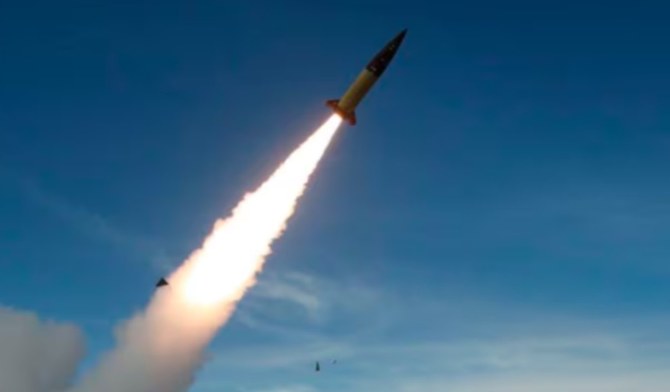
- Washington confirmed the day before that it had sent Ukraine a variant of the ATACMS missile with a range of 300 kilometers
- “In terms of Taurus... this is a decision for Germany,” a senior US defense official told journalists
WASHINGTON: The United States hopes decisions by it and allied countries to send long-range missiles to Ukraine may encourage similar action by Germany, which has so far refused to provide its Taurus missiles, a US official said Thursday.
Washington confirmed the day before that it had sent Ukraine a variant of the ATACMS missile with a range of 300 kilometers (190 miles), while France and Britain have respectively supplied SCALP and Storm Shadow missiles, both of which have a range of about 250 kilometers.
“In terms of Taurus... this is a decision for Germany,” a senior US defense official told journalists when asked if the provision of long-range ATACMS could clear the way for Taurus missiles to be sent to Kyiv.
“But certainly the US provision of ATACMS as well as prior decisions by the UK and France to provide long-range cruise missiles, we would certainly hope that this would be a factor,” the official said, speaking on condition of anonymity.
Kyiv has long pushed for Germany to provide it with Taurus missiles — which can reach targets up to 500 kilometers away — to help its fight against invading Russian forces.
But Berlin has declined to send the missiles, fearing that it would lead to an escalation of the more-than-two-year-old conflict.
Moroccan man guilty of murdering man in UK in revenge for Gaza
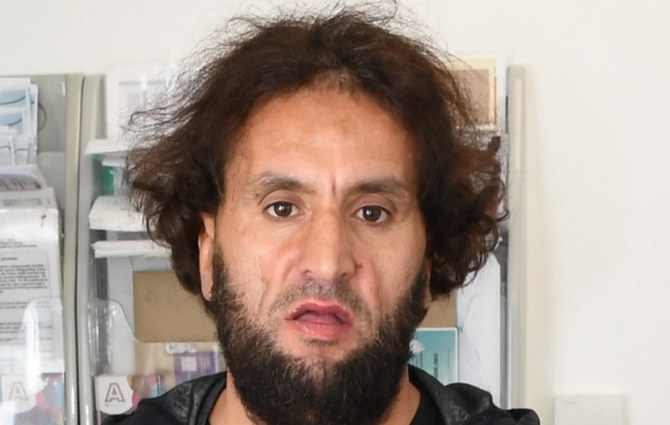
- Ahmed Alid killed his 70-year-old victim after approaching him from behind
- After his arrest, he told detectives he had committed the acts because of the conflict in Gaza, and in revenge for Israel killing innocent children
LONDON: A Moroccan man who stabbed to death a passer-by in the street in northeast England in what he later told police was revenge for Israeli action in Gaza was found guilty of murder on Thursday.
Ahmed Alid, 45, who had sought asylum in Britain, killed his 70-year-old victim after approaching him from behind on a road in Hartlepool the early hours of Oct. 15 last year, having previously attacked his housemate with two knives, prosecutors said.
After his arrest, he told detectives he had committed the acts because of the conflict in Gaza, and in revenge for Israel killing innocent children, blaming Britain for creating Israel, Britain’s Crown Prosecution Service (CPS) said.
Alid said if he had had a machine gun, and more weapons, he would have killed more people.
“By his own admission, Ahmed Alid would have killed more people on that day if he had been able to,” Nick Price, Head of the CPS Special Crime and Counter Terrorism Division, said in a statement.
“Whatever his views were on the conflict in Gaza, this was a man who chose to attack two innocent people with a knife, and the consequences were devastating.”
Alid had first used two knives to attack his sleeping housemate, to whom he had become aggressive after learning of his conversion to Christianity, stabbing him six times while shouting “Allahu Akbar,” or “god is greatest,” the CPS said.
The 32-year-old housemate, one of five asylum seekers who shared the property, managed to fight him off and another occupant came to his aid. Alid left the house with one of the knives and walked toward the center of Hartlepool.
He passed Terence Carney on the opposite side of the road before circling back and attacking him from behind, stabbing him six times in the chest, abdomen and back. Carney died shortly after police arrived.
Following his interview with police, he attacked the two female detectives, with one suffering injuries to her shoulder and wrist.
He was found guilty at Teeside Crown Court of murder, attempted murder and two counts of assaulting an emergency worker. He will be sentenced on May 17, when the judge will decide if his actions were related to terrorism.
India dismisses US human rights report as ‘deeply biased’
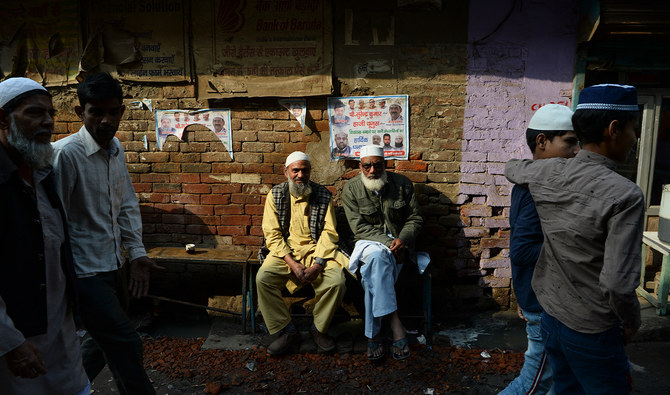
- Report found “significant” abuses in India’s Manipur state and attacks on minorities, dissenters
- India’s foreign ministry spokesperson says New Delhi does not attach any “value” to the report
NEW DELHI: New Delhi said on Thursday it does not attach any value to a US State Department report critical of human rights in India, and called it deeply biased.
The annual human rights assessment released earlier this week found “significant” abuses in India’s northeastern Manipur state last year and attacks on minorities, journalists and dissenting voices in the rest of the country.
Asked about it, Indian foreign ministry spokesperson Randhir Jasiwal told journalists on Thursday that the report “as per our understanding, is deeply biased and reflects a very poor understanding of India.”
“We attach no value to it and urge you to also do the same,” Jaiswal said.
Responding to a question about the growing protests on US university campuses against Israel’s offensive in Gaza that has killed more than 33,000 people, Jaiswal said that “there has to be the right balance between freedom of expression, sense of responsibility and public safety and order.”
He added that “democracies in particular should display this understanding in regard to other fellow democracies, after all we are all judged by what we do at home and not what we say abroad.”
While India and the US have a tight partnership, and Washington wants New Delhi to be a strategic counterweight to China, the relationship has encountered some minor bumps recently.
In March New Delhi dismissed US concerns over the implementation of a contentious Indian citizenship law, calling them “misplaced” and “unwarranted,” and objected to a US State Department official’s remarks over the arrest of a key opposition leader.
Last year Washington accused Indian agents of being involved in a failed assassination plot against a Sikh separatist leader in the US, and warned New Delhi about it.
India has said it has launched an investigation into Washington’s accusations but there has not been any update about the investigation’s status or findings.
Sweden to send NATO troops to Latvia next year: PM
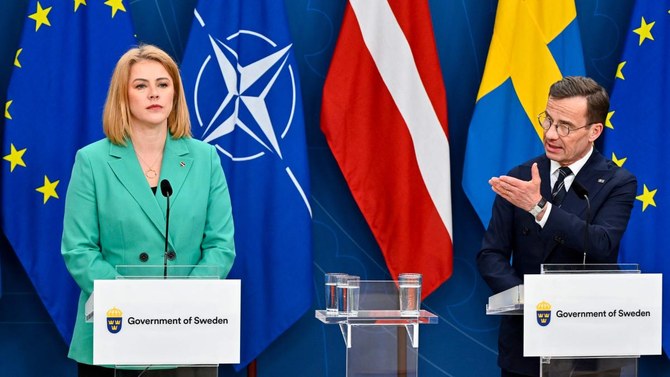
- The Swedish troop contribution was the first to be announced since the Scandinavian country joined NATO in March
- The battalion would be comprised of around 400 to 500 troops
STOCKHOLM: Sweden will next year contribute a reduced battalion to NATO forces in Latvia to help support the Baltic state following Russia’s invasion of Ukraine, Prime Minister Ulf Kristersson said Thursday.
The Swedish troop contribution was the first to be announced since the Scandinavian country joined NATO in March.
Kristersson had in January announced that Sweden would likely send a battalion to take part in NATO’s permanent multinational mission in Latvia, dubbed the Enhanced Forward Presence, aimed at boosting defense capacity in the region.
“The government this morning gave Sweden’s armed forces the formal task of planning and preparing for the Swedish contribution of a reduced mechanized battalion to NATO’s forward land forces in Latvia,” Kristersson told reporters during a press conference with his Latvian counterpart Evika Silina.
He said the battalion, which will be in Latvia for six months, would be comprised of around 400 to 500 troops.
“Our aim is a force contribution, including CV 90s armored vehicles and Leopard 2 main battle tanks.”
“We’re planning for the deployment early next year after a parliament decision,” he said.




